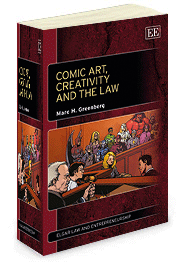The characters and stories found in comic art play a dominant role in contemporary popular culture throughout the world. In this first-of-its-kind work, Comic Art, Creativity and the Law examines how law and legal doctrine shapes the creative process as applied to comic art.This is an enjoyable and thoughtful book, part legal analysis, part history, part speculation and part personal reflection. The impact of the law on the fruits of creation is easier to assess than its impact on those aspects of creativity which it may deter or stifle, and the use of comic art as a powerful form of parody, satire or social comment keeps returning it to the point at which freedom of expression meets countervailing rights and interests -- but this book is neither repetitive nor preachy, even though Marc Greenberg never leaves it to his readers to guess his thoughts and feelings.
The book examines the impact of contract law, copyright law (including termination rights, parody and ownership of characters), tax law and obscenity law has on the creative process. It considers how these laws enhance and constrain the process of creating comic art by examining the effect their often inconsistent and incoherent application has had on the lives of creators, retailers and readers of comic art. It uniquely explains the disparate results in two key comic book parody cases, the Winter Brothers case and the Air Pirates case, offering an explanation for the seemingly inconsistent results in those cases. Finally, it offers a detailed discussion and analysis of the history and operation of the ‘work for hire’ doctrine in copyright law and its effect on comic art creators.
Designed for academics, practitioners, students and fans of comic art, the book offers proposals for changes in those laws that constrain the creative process, as well as a glimpse into the future of comic art and the law.
Apart from Justin Hughes' encomium, there is no mention of the words "United" and "States" in conjunction with one another and, though there is the occasional reference to some non-US issue, the text is unashamedly US focused, sparing just six pages towards the end for an acknowledgement of the Franco-Belgian and Japanese traditions. This is not a crime, of course, but it would be appreciated if publishers were to flag single-jurisdictional works as being so, in order that readers and potential purchasers should not be encouraged to think of the work as having some sort of international significance. For the past 20 years, entrepreneurship in fields like comic art and, dare one say it, creativity, has been looking increasingly to the internet for commercial routes to exploitation, and the internet is not coterminous with the borders of the United States. It is hoped that future editions of this worthwhile and enjoyable book will either be encouraged to spread their focus a little wider or will clearly indicate that they don't.
There's one final, trivial quibble: the illustration on the publisher's website, reproduced above, creates the impression that this book is thicker than it actually is. Following xix pages of preliminaries, the text -- inclusive of the index -- totals just 199 pages.
Bibliographic data: hardback ISBN 978 1 78195 492 8; ebook ISBN 978 1 78195 493 5. Hardback price£70 (online from the publisher, £63). Web page here.

No comments:
Post a Comment